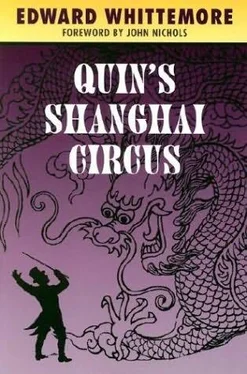Edward Whittemore - Quin’s Shanghai Circus
Здесь есть возможность читать онлайн «Edward Whittemore - Quin’s Shanghai Circus» весь текст электронной книги совершенно бесплатно (целиком полную версию без сокращений). В некоторых случаях можно слушать аудио, скачать через торрент в формате fb2 и присутствует краткое содержание. Жанр: Фэнтези, на английском языке. Описание произведения, (предисловие) а так же отзывы посетителей доступны на портале библиотеки ЛибКат.
- Название:Quin’s Shanghai Circus
- Автор:
- Жанр:
- Год:неизвестен
- ISBN:нет данных
- Рейтинг книги:3 / 5. Голосов: 1
-
Избранное:Добавить в избранное
- Отзывы:
-
Ваша оценка:
- 60
- 1
- 2
- 3
- 4
- 5
Quin’s Shanghai Circus: краткое содержание, описание и аннотация
Предлагаем к чтению аннотацию, описание, краткое содержание или предисловие (зависит от того, что написал сам автор книги «Quin’s Shanghai Circus»). Если вы не нашли необходимую информацию о книге — напишите в комментариях, мы постараемся отыскать её.
Quin’s Shanghai Circus — читать онлайн бесплатно полную книгу (весь текст) целиком
Ниже представлен текст книги, разбитый по страницам. Система сохранения места последней прочитанной страницы, позволяет с удобством читать онлайн бесплатно книгу «Quin’s Shanghai Circus», без необходимости каждый раз заново искать на чём Вы остановились. Поставьте закладку, и сможете в любой момент перейти на страницу, на которой закончили чтение.
Интервал:
Закладка:
A tall, gaunt figure stepped forward from the shadows, his eyes raised to heaven. He had the features of a Westerner and the clothes of a cleric. A specific deed was about to be performed.
Geraty stared. Only one man in Asia answered to that description.
Lamereaux piously crossed himself, but his next action wasn’t at all what Geraty had expected. The priest’s hand shot out and made a flickering motion, a deft and practiced movement much like Geraty’s own when he was inserting a ball of horseradish in his nose. The hand withdrew, the corporal retrieved his trousers and fled.
Geraty watched Lamereaux drop to his knees. The Jesuit took hold of his rosary and recited the fifty-three Hail Marys, curiously omitting both the Credo and the Our Fathers. The clouds closed as suddenly as they had opened. In the darkness Geraty heard the priest begin to sing the Litany of the Saints.
Once more Geraty’s narrative broke down. He became incoherent, he sobbed, he hid his face and whispered. He admitted the scene infuriated him, but he wouldn’t say why.
Quin had no way of knowing what it meant. Was it because the money Geraty had stolen was now being given to someone else? To someone he knew? Because that person was Father Lamereaux?
Who or what enraged him? The corporal? Lamereaux? A gesture by the priest that mimicked his own?
Or simply himself.
Geraty whispered over his bowl of turnips. He cried. He buried his scarred face in the folds of his greatcoat. Again it took some time before Quin could coax him back to the story.
Fury, hissed Geraty. Overweening wrath was upon me.
His first impulse had been to rush over and give Lamereaux a beating, beat him mercilessly over the head and shoulders as he knelt there in the darkness. But fortunately it had been many years since he’d heard the Litany from beginning to end. The sound of Latin was a nostalgic memory to him, a monotonous chant from his childhood. He knew the chant would last a good thirty minutes, so there seemed no reason to hurry the beating.
He was lying on his stomach. The buzz of Latin was comforting. Long before the Litany ended he had fallen asleep for the second time that night.
The next day he went to see Father Lamereaux, who it turned out had a hangover every bit as bad as his own. The two men drank green tea and swallowed fistfuls of aspirins, but that was no help to either of them. Before long Lamereaux suggested something stronger and broke out a bottle of Irish whiskey.
An hour later they were both feeling better. They got into a discussion on No plays and proceeded to lecture each other. Finding words inadequate, Lamereaux got to his feet to illustrate a point by acting out a scene. Geraty watched him, then in answer acted out a scene of his own. They tried a second sequence and discovered they both knew all the movements, all the poses.
When they were drunk Geraty mentioned what he had seen in the cemetery and how Lamereaux’s choice of the Litany had probably saved him from a beating. The two exiles laughed so hard they were in tears. Lamereaux broke out a second bottle of Irish whiskey and they began drinking in earnest.
The afternoon turned into the evening. Much of the truth Geraty had already guessed. Father Lamereaux told him the rest.
The Jesuit had always been opposed to Japanese militarism, he wanted to help China and the West if he could. After his friend Adzhar had arranged the meeting on the beach, he had known what to do. The Japanese acolytes who had served him over the years were still loyal to him. By then many of them had good positions in the army, the ministries, the occupied areas of China. Some traveled back and forth throughout the Empire on one mission or another. Their bits and pieces of information could be compiled to form a complete intelligence picture.
The problem was getting the information out of Japan. Some of the ex-acolytes traveled to areas where contact could be made with Allied agents, but how were they to smuggle the reports out of Tokyo? The information was too bulky to be memorized. Everyone was searched both going and coming by the secret police. Father Lamereaux analyzed the problem and found a solution.
The Kempeitai considered itself the defender of the samurai tradition. Its officers and agents prided themselves on their fierceness, their warlike masculinity. Therefore when they searched a young man they only went so far. Their searches were thorough with one exception. As a result, Lamereaux’s couriers could always get through with the microfilm they carried in his small bamboo device.
Device? Nothing more than a hollow piece of bamboo sealed at both ends. Among the couriers it was called Lamereaux’s Lumbago because of the severe backaches it caused when the courier run was a long one, deep into China, say.
Thus had Lamereaux been responsible for the most successful invention in the history of espionage, the living dead drop, revolutionary because it moved where the master spy wanted it to go, because it recognized for the first time the very simple concept that espionage, the collection and storage of information, was based on the principle of man’s anus.
Lamereaux asked Geraty to keep the story of his incredible intelligence pipeline a secret, and of course Geraty agreed. He even went so far as to destroy the one vague report on the ring that appeared in the files of the Kempeitai after the war.
And the fire he had started, claimed Geraty, the fire that had burned down an entire wing of the Kempeitai warehouse and lost him his job in the Occupation, the beginning of his downfall and degradation, that fire had been set for no other reason than to conceal the destruction of that one vague report.
True, shouted Geraty. All true. That’s how it ended and that’s how it began. Awake setting a fire one night after the war, asleep in a cemetery one night a decade earlier. Ended and began it did, and not even Edward the Confessor can tell you more.
Geraty hung his head. He peeked over his shoulder at the bodies lying in the vacant lot. With a shudder he lowered his face into the steam rising from the vegetables boiling on the pushcart. He teetered on his stool. He was whispering.
Asleep and awake, you say? Awake? The time came that night when Lamereaux and I had finished that second bottle of Irish whiskey. Done we were, saints preserve us, and we knew it. The old days were gone and we knew it. We were two drunk butterflies circling a candle, two motionless No actors stuck in a pose, two exiles in the secret bag the Almighty was carrying across Asia. War. The Orient thirty years ago.
Geraty’s head hung over a bowl of turnips. He stared at the turnips, the steam creeping up along the layers of sweaters, the red flannel tied with string, the black bowler hat pulled down to his bulging eyes. His dark, gloomy face was cut with scars, running with tears.
Quin waited. After five or ten minutes of silence he tapped Geraty on the shoulder.
My father. What about him?
Your father, hissed Geraty, who’s your father? Who are you?
His fist struck the counter. He waved his arms in the air, fighting off imaginary bats and spiders and falcons. All at once he was on his feet moving away from the pushcart, roaring and shouting curses, shaking his fists at the sky.
Slander, do you hear? They call him a drunkard and a pederast and that’s how they’ve always treated him, with lies and ridicule. Do they know a man of God when they see one? Do they? Just point him out to them, point him out now, point him out where he stands. Point out that Emperor so they can slander him and malign him and drive him where? Where ?
Geraty crashed into the vacant lot and fell on his back, his greatcoat settling around him. Quin propped the black bowler hat under his head. He felt his pulse and listened to the painful rasp of his snoring. There was no way to move him. He would have to lie there until he awoke.
Читать дальшеИнтервал:
Закладка:
Похожие книги на «Quin’s Shanghai Circus»
Представляем Вашему вниманию похожие книги на «Quin’s Shanghai Circus» списком для выбора. Мы отобрали схожую по названию и смыслу литературу в надежде предоставить читателям больше вариантов отыскать новые, интересные, ещё непрочитанные произведения.
Обсуждение, отзывы о книге «Quin’s Shanghai Circus» и просто собственные мнения читателей. Оставьте ваши комментарии, напишите, что Вы думаете о произведении, его смысле или главных героях. Укажите что конкретно понравилось, а что нет, и почему Вы так считаете.












